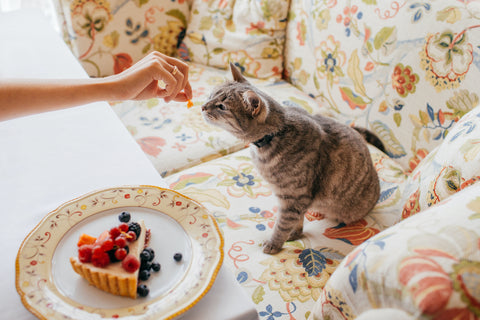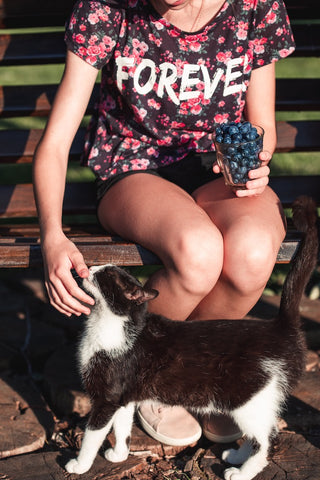Can Cats Eat Raspberries Safely?
Cats are known for their curious nature and often express interest in the food we eat. As responsible pet owners, it's essential to understand what is safe for our feline friends to consume. Raspberries are a delicious and nutritious fruit enjoyed by many, but can cats eat raspberries?
Everything You Need to Know About Feeding Raspberries to Cats

Can Cats Eat Raspberries?
The short answer is yes, cats can eat raspberries in moderation. Raspberries are non-toxic to cats and can be a healthy addition to their diet when given as an occasional treat. However, there are some important considerations to keep in mind.
Benefits of Raspberries for Cats
Raspberries can offer several potential benefits for cats when given in moderation as part of a well-balanced diet.
Here are some of the potential benefits of raspberries for cats:
Nutritional Content: Raspberries are a good source of essential vitamins and minerals, including vitamin C, vitamin K, manganese, and dietary fiber. These nutrients can contribute to your cat's overall health.
Antioxidants: Raspberries are rich in antioxidants, particularly anthocyanins and quercetin. Antioxidants help combat free radicals in your cat's body, potentially reducing the risk of chronic diseases and supporting their immune system.
Hydration: Raspberries have a high water content, which can contribute to your cat's hydration levels. This can be particularly beneficial for cats that are not inclined to drink enough water, helping to prevent urinary tract issues.
Fiber: The dietary fiber in raspberries can aid in digestion and promote regular bowel movements. Fiber is essential for maintaining a healthy digestive system in cats.
Weight Management: Raspberries are relatively low in calories but can help your cat feel full due to their fiber content. This can be beneficial for cats that need to manage their weight or reduce overeating.
Variety and Enrichment: Introducing a variety of safe and healthy treats, like raspberries, can provide mental and sensory stimulation for your cat. It can be a way to break the monotony of their regular diet and provide mental enrichment.
Flavorful Treat: Some cats enjoy the sweet and tangy taste of raspberries, making them a delightful and special treat. Using raspberries as a positive reinforcement during training can enhance your bond with your cat.
Allergen-Free: Raspberries are generally not associated with common cat food allergies, making them a safe option for most cats. However, individual cats may have unique sensitivities, so always monitor their response when introducing new foods.
Tips for Feeding Your Cat Raspberries
Moderation: While raspberries are safe for cats, they should be given in moderation. Too many raspberries can lead to digestive upset, including diarrhea.
Small Portions: Start by offering a small portion of raspberries to your cat. Observe how your cat reacts and ensure they do not develop any adverse reactions.
Fresh Raspberries: Always offer fresh raspberries and avoid those that are overripe or moldy, as these can be harmful to your cat's health.
Remove Seeds: Raspberries have small seeds that can be a choking hazard for cats. It's best to remove the seeds before offering raspberries to your cat.
Allergies: Some cats may have allergies or sensitivities to certain foods. If you notice any signs of allergic reactions, such as itching, sneezing, or digestive issues, discontinue feeding raspberries immediately and consult your veterinarian.
Weight Management: Raspberries contain natural sugars, so be mindful of your cat's weight and calorie intake. Overfeeding can lead to obesity.
Training and Bonding: Using raspberries as treats during training sessions can help strengthen your bond with your cat. This positive reinforcement can be a great way to encourage desired behaviors.
Frozen Raspberries: Some cats may enjoy frozen raspberries, especially during hot weather. They can serve as a refreshing and hydrating treat, but be cautious about offering them in small, manageable portions to prevent brain freeze.
Homemade Cat Treats: If you want to incorporate raspberries into homemade cat treats, ensure you use cat-safe recipes that consider their dietary needs. These recipes should be well-balanced and approved by a veterinarian.
Canned Raspberries: Avoid offering canned raspberries to your cat. These can contain added sugars and syrups, which are not suitable for feline consumption.
Frozen Raspberry Puree: If you'd like to create a special treat for your cat, you can blend fresh raspberries into a puree, freeze it in small ice cube trays, and offer your cat a small portion as a refreshing, summertime treat.
Consult Your Vet: Before introducing any new food into your cat's diet, it's always a good idea to consult with your veterinarian, as they can provide personalized guidance based on your cat's specific needs.

Other Fruits That are Safe for Cats to Eat
Several fruits are safe for cats to eat in moderation. These fruits can be a healthy and enjoyable addition to your cat's diet, provided they are fresh, ripe, and prepared appropriately. Here are some fruits that are generally considered safe for cats:
Blueberries: Blueberries are rich in antioxidants and low in calories, making them a healthy and tasty treat for cats. They can help support your cat's immune system and overall health.
Strawberries: Strawberries are another source of antioxidants, vitamins, and dietary fiber. Cats may enjoy the sweet taste of ripe strawberries.
Cantaloupe: Cantaloupe is a hydrating fruit with vitamins A and C. Remove the seeds and rind, and offer small, bite-sized pieces to your cat.
Watermelon: Cats can consume watermelon in moderation. It's a refreshing fruit that can help with hydration, but remember to remove seeds and offer only the flesh.
Pears: Pears are a good source of fiber, and some cats may enjoy the texture and flavor. Be sure to remove the seeds and core before offering.
Apples: Apples, without seeds and core, can be safe for cats. Apples are a source of dietary fiber and vitamin C.
Bananas: Bananas are low in fat and high in potassium. Some cats may enjoy small pieces of ripe banana as an occasional treat.
Mango: Mango is safe for cats in small amounts. It provides vitamins and antioxidants. Ensure you remove the pit and offer only the flesh.
Peaches: Fresh peaches, without the pit, can be a tasty and nutritious treat for some cats.
Apricots: Like peaches, fresh apricots are safe when the pit is removed. They provide vitamins and fiber.
Kiwi: Kiwi is a source of vitamin C and dietary fiber. Remove the skin and offer small, diced pieces.
Pineapple: Fresh pineapple can be safe for cats if given in moderation. It contains vitamin C and bromelain, an enzyme that may aid digestion.
Remember, not all cats will have the same preferences or tolerances, so it's essential to consider your cat's individual response. Some cats may love fruits, while others may have no interest. Always offer fruits as an occasional treat and ensure that the majority of your cat's diet consists of high-quality commercial cat food to meet their nutritional needs. If you have any doubts or concerns about your cat's diet, consult your veterinarian for guidance.
Leave a comment
